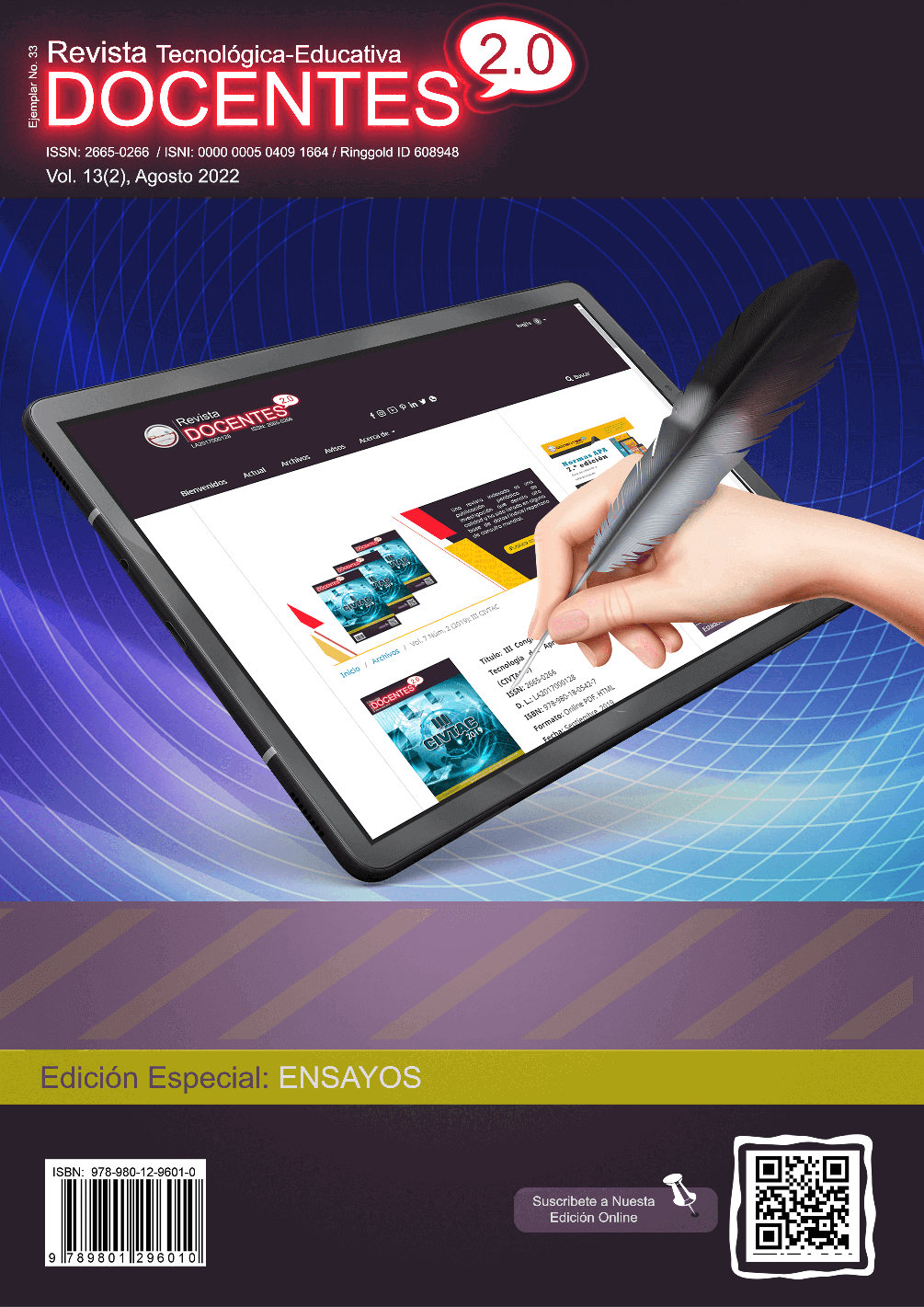The Role of the Teacher in its Historical Process and its Function before Society in Various Contexts
 DOI:
https://doi.org/10.37843/rted.v13i2.238
DOI:
https://doi.org/10.37843/rted.v13i2.238
Main Article Content
Abstract
The present documentary research was supported by the qualitative approach, of the hermeneutical paradigm, of an informative-interpretative type, with a topic design. Currently, the topic of education is of great importance; many times, negative and positive criticisms are heard in the same way because, in the country, there is a specific deficiency in terms of education, for which it is considered a problem both for public policies and private. Nowadays, it is observed that the responsibility of educating our students falls on the two essential pillars in the life of the student body, the family and the school. In the family context, parents carry out educational and social tasks; the teacher is the crucial educational training agent in school. For this reason, this essay aims to analyze the situation of teachers, the functions currently performed, and if they are appropriate for the student community. It is essential to mention that teachers not only transmit knowledge but also influence student decisions, promoting the values that young people will take directly or indirectly in their training before society. In this way, it is of the utmost importance to pay special attention to the different factors contributing to the teacher's performance during the student's development.
Downloads
Metrics
Article Details

This work is licensed under a Creative Commons Attribution-NonCommercial-NoDerivatives 4.0 International License.
Those authors who have publications in our journal accept the following terms:
- When a work is accepted for publication, the author retains rights of reproduction, distribution of his/her article for exploitation in all countries of the world in the format provided by our magazine and any other magnetic medium, optical, and digital.
- Authors will retain their copyright and guarantee the journal the right first to publish their work, which will be simultaneously subject to the Creative Commons Acknowledgment License (Attribution-NonCommercial-NoDerivatives 4.0 International (CC BY-NC-ND 4.0)). That allows third parties to copy and redistribute the material in any medium or format, under the following conditions: Acknowledgment - You must properly acknowledge authorship, provide a link to the license, and indicate if any changes have been made. You may do so in any reasonable way, but not in a way that suggests you have the licensor's endorsement or receive it for your use. NonCommercial - You may not use the material for a commercial purpose. NoDerivatives - If you remix, transform, or build from the material, you cannot broadcast the modified material. There are no additional restrictions - You cannot apply legal terms or technological measures that legally restrict you from doing what the license allows.
- Authors may adopt other non-exclusive license agreements to distribute the published version of the work (e.g., deposit it in an institutional archive or publish it in a monographic volume) provided that the initial publication in this journal is indicated.
- Authors are allowed and recommended to disseminate their work through the Internet (e.g., in institutional telematic archives, repositories, libraries, or their website), producing exciting exchanges and increasing the published work's citations.
- Request of withdrawal an article has to be done in writing by the author to the Editor, becoming effective after a written response from the Editor. For this purpose, the author or authors will send correspondence via e-mail: [email protected].
- The author will not receive financial compensation for the publication of his work.
- All Docentes 2.0 Journal publications are under the Open Journal System (OJS) platform at: https://ojs.docentes20.com/.
References
Benavides, M., Cuba, S., De Moura Castro, C., & Hidalgo, L. (2008). Profesión docente en Latinoamérica una agenda pendiente y cuatro retos emergentes. Tarea Asociación gráfica educativa.
Calderón, T. (2018). Paradigma Educativo. SlideShare.
Diaz-Barriga, A., & Inclan-Espinoza, C. (2001). El docente en las reformas educativas: Sujeto o ejecutor de proyectos ajenos. Revista Iberoamericana de Educación. https://rieoei.org/historico/documentos/rie25a01.htm DOI: https://doi.org/10.35362/rie250986
Freinet, C. (1996). La escuela moderna francesa. Una pedagogía moderna de sentido común. Las invariantes pedagógicas (2ª Edición). Ed. Morata.
Gimeno-Sacristán, J. (2011). Educar y convivir en la cultura global: Las exigencias de la ciudadanía. Ediciones Morata.
Larrea-Salem, A. (2015). Salud Mental en Docentes: Un Análisis desde la Perspectiva del Burnout. Dspace. http://dspace.uhemisferios.edu.ec:8080/xmlui/bitstream/handle/123456789/208/Ensayo%20Acad%c3%a9mico.pdf?sequence=1&isAllowed=y
Mardones, J. M. (1999). Desafíos para recrear la escuela. PPC.
Mejía, L. (22 de junio de 2017). Informática educativa. [Paradigmas Educativos]. https://misrecuerdos2017.wordpress.com/2017/06/22/primera-entrada-de-blog/
Moura-Castro, C., & Loschpe, G. (2007). La remuneración de los maestros en América Latina: ¿Es baja? ¿Afecta la calidad de la enseñanza? Preal, 37. http://www.ub.edu/obipd/docs/la_remuneracion_de_los_maestros_en_america_latina._de_mourac.pdf
Mujica-Sequera, R. (17 de Octubre de 2015). Calidad de la Educación. [Blog Docentes 2.0]. https://blog.docentes20.com/2015/10/calidad-de-la-educacion/
Pérez, E. C., & Reyes-Rodríguez, Y. (2021). Competencias Tecnológicas: Un Nuevo Modelo Pedagógico. Revista Tecnológica Educativa Docentes 2.0, 76-83. https://doi.org/10.37843/rted.v11i2.246 DOI: https://doi.org/10.37843/rted.v11i2.246
Piaget, J. (1980). Psicología y pedagogía. Ariel.
Prieto-Jiménez, E. (2008). El papel del profesorado en la actualidad. Su función docente y social. Foro de Educación, 6 (10). 325-345. https://www.redalyc.org/pdf/4475/447544585017.pdf
Raza-Quelal, A. E. (2019). La relación del vínculo de apego entre docente/estudiante para el desarrollo de las funciones ejecutivas. Repositorio Dspace. http://dspace.uhemisferios.edu.ec:8080/xmlui/bitstream/handle/123456789/838/LA%20RELACI%c3%93N%20DEL%20V%c3%8dNCULO%20DE%20APEGO%20ENTRE%20DOCENTEESTUDIANTE%20PARA%20EL%20DESARROLLO%20DE%20LAS%20FUNCIONES%20EJECUTIVAS.pdf?sequence=1&isAllowed=y
Rivera-López, L. I. (21 de septiembre de 2011). Dimensión política, cultura y ética educativa. [El papel del docente como gestor en el contexto actual] http://antropospedagogicus20112.blogspot.com/2011/09
Rodríguez-Guzmán, L. (2012). Condiciones de Trabajo Docente: Aportes de México en un Estudio Latinoamericano (pp. 18-27). Diálogos Educativos.
Tancara Q. C. (1993). La Investigacion Documental. Temas Sociales, (17), 91-106. http://www.scielo.org.bo/scielo.php?script=sci_arttext&pid=S0040-29151993000100008&lng=es&tlng=es.
Travers, C. J., & Cooper, C. L. (1997). El estrés de los profesores, la presión en la actividad docente. Paidos Ibérica S.A.
Villavicencio-Avalos, A. (octubre de 2020). Quizlet. [Psicología educativa] https://quizlet.com/mx/539433014/psicologia-educativa-flash-cards/






